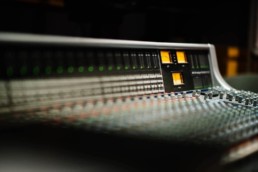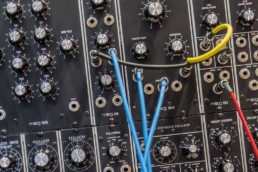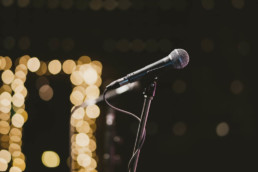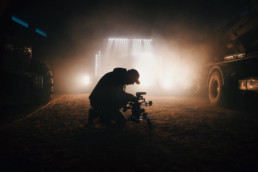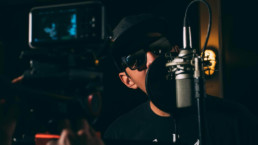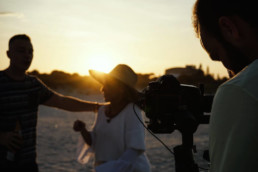Audible Magic Review: An Article on Live Streaming and the New European Copyright Directive
Whether you agree with the new European Copyright Directive or not, an objective of the Directive was to ‘clarify’ the definition and obligations of online content sharing service providers (“OCSSP”). One area which remains unclear, however, is the application of the Directive to ‘live streaming’ platforms – which in these times are becoming an increasingly significant category of media.
A new article by one of Europe’s leading copyright law experts, Dr. Eleonora Rosatii, examines live streaming services in the context of existing EU copyright law and the new 2019 EU Directive on Copyright.
Conclusion: Live Streaming Platforms Classified as OCSSPs
Dr. Rosati’s analysis concludes that live streaming platforms fall within the definition of an ‘online content sharing service provider’ under the new 2019 EU Directive on Copyright in the Digital Single Market (The Copyright Directive). These platforms can, therefore, be held directly liable for copyright infringement by making infringing streams, initiated by their users, available to the public.
In this respect, the Copyright Directive does not materially alter their position as it stood under EU law prior to the Directive being passed. What is different, is Article 17 provides live streaming platforms protection from liability, if they make best efforts to get licenses and take measures according to high industry standards to ensure the non-availability of infringing content via their platform.
Summary of Analysis
Given the huge spike in live streams of DJ sets during the COVID-19 pandemic, this timely article looks at live-streamed performances and notes that, if the performance had taken place in a public venue, the venue would have been required to obtain copyright licenses.
Dr. Rosati examines the situation of a hypothetical Platform X: DJs upload live streams of their performances which include the playing of copyright sound recordings. Platform X stores the material only for so long as necessary to enable the uploads to be transcoded and then streamed to an audience of frustrated would-be club-goers. Storage is therefore ephemeral, and no copies of the DJ sets are stored for future on-demand streams or downloads. The live streams are indexed by the platform, enabling would-be listeners to search and find streams or DJs they like.
The author explores the platform’s direct liability under the principles of existing EU law for making user-generated content available to the public. These principles were developed in successive cases decided by The Court of Justice of the European Union, culminating in the express finding of direct liability in the 2017 decision in Ziggo (the Pirate Bay case)(C-610/15). The precise nature and scope of this liability remains uncertain as evidenced by the number of CJEU referrals currently pending in this area (YouTube, C-682/18; Elsevier (C-683/18); Stichting Brein (C-442/19); and Puls 4 TV (C-500/19)).
Dr. Rosati says that it is not surprising that the Copyright Directive is characterized (in Recital 64) as a ‘clarification’ of existing law. She points out that where Article 17 goes beyond the pre-2019 EU copyright regime, it is not in the direct liability of OCSSPs for acts of communication or making available to the public, but in the regime that it establishes around that potential liability.
The article also examines whether a live streaming service can be considered an Online Content-Sharing Service Provider (OCSSP). Article 2(6) of The Copyright Directive defines an OCSSP as an online service, one of whose main purposes is “to store and give the public access” to large amounts of copyright content which it “organizes and promotes for profit-making purposes.” The issue is whether the ephemeral nature of the storage disqualifies the live streaming platform from being classified as an OCSSP. Rosati examines this question in-depth in the context of the Copyright Directive and the E-Commerce Directive and concludes:
“Live streaming providers that behave like Streaming Platform X in the example above are to be regarded as OCSSPs, even if the storage made of user-uploaded content is limited in time. What is relevant for the qualification of a provider as an OCSSP in principle is the purpose that it pursues (to store and give the public access to a large amount of protected subject matter uploaded by users) and, with that, the role that it performs (organization and promotion of such subject matter for profit-making purposes), not the duration (e.g., permanent or temporary storage of protected content) of the activity at hand.”
Dr Rosati concludes that the activities of the live streaming platforms are therefore governed by Article 17(4) of the Copyright Directive, and because of that, OCSSPs can protect themselves from liability, if they make efforts to obtain licenses for the content, and in the absence of any license, use best efforts, according to high industry standards, to prevent the availability of unlicensed content contained in the live streams. In conclusion, if live streaming platforms are classified as OCSSPs, the new Copyright Directive provides them a new ‘safe-harbour’ from liability provided they meet their other Article 17 obligations.
Commentary: Platforms Benefit from Safe Harbour as 2019 Copyright Directive OCSSP
The relevance of this article to live streaming platforms is clear and the implications are significant. Any live streaming service that gives public access to large amounts of copyright content uploaded by users, which it organizes and promotes for profit-making purposes, can be held directly liable for copyright infringement. This applies to both pre- and post- 2019 EU Copyright Directive regimes.
Prior to the Directive, even if a live streaming platform tried to get licenses and employed content recognition technologies to prevent unlicensed uploads, the platform would be liable for any infringing content that managed to get uploaded to its platform.
The new Copyright Directive changes that: The platform can now protect itself from direct liability by taking the steps prescribed in Article 17(4). These include using best efforts, according to high industry standards, to ensure the non-availability of content, in respect of which the copyright owner has provided relevant and necessary information.
_______________________________________________________________________________________________
[i] Associate Professor in Intellectual Property (IP) Law at Stockholm University; Guest Professor at CEIPI-Université de Strasbourg; Research Associate and Lecturer at EDHEC Business School; Associate at the Centre for Intellectual Property and Information Law at the University of Cambridge; Of Counsel at Bird & Bird; and Editor of the Journal of Intellectual Property Law & Practice (Oxford University Press, peer-reviewed). Dr. Rosati holds law degrees from the University of Florence, an LLM from the University of Cambridge, and PhD from the European University Institute.
Audible Magic Corporation Review is issued for informational purposes only and is not intended to be construed or used as general legal advice. Please contact the author(s) or your Audible Magic Corporation contact if you have questions regarding the currency of this information.
For more than 20 years, Audible Magic has innovated solutions to identify content, manage rights, and monetize media. Audible Magic’s Emmy-winning automatic content recognition (ACR) technology powers billions of transactions monthly. The Silicon Valley pioneer is the trusted intermediary among rights holders (including labels, studios, distributors, publishers, and collectives) and major platforms.
Audible Magic is a service mark and trade name of Audible Magic Corporation ©2020 Audible Magic Corporation. All rights reserved.
Plan Now
It is important to start planning now on how to meet the requirements and understand the impact of the Directive on your business.
Below are some resources to help you understand the Directive and how it may impact your business.
- Take our A17 Assessment Survey for platforms to assess if the Directive affects your company and then assess your readiness to comply
- Understand how small social networks will be impacted
- Read the full text of the Directive
- And more is available on our Article 17 page as well as in our blog section
Audible Magic Launches AMLive™ to Protect Against Rebroadcasting Premium Content by Users of Live Streaming Platforms
Los Gatos, CA (April 3, 2018) — Audible Magic Corporation, the leader in audio and video digital content identification solutions, announced today the availability of AMLive — a new service to identify unauthorized user streams of premium content registered by rights holders. The service addresses industry needs to protect live sports, live-broadcasted music and other premium content. AMLive operates on both live streams and video-on-demand.
Using a simple dashboard or via an API to integrate into existing workflows, AMLive makes it easy for broadcasters and programmers to register live broadcast events. Once content is registered with Audible Magic, the social platforms can automatically identify and block unauthorized streams in real-time.
“Content owners can now more easily ensure their valuable content is available only from authorized streaming services.” said Vance Ikezoye, Co-founder and CEO of Audible Magic. “AMLive is well suited for the live sports industry, where piracy of live streams is a major concern. The service also addresses a growing issue where recorded music is streamed live by bedroom DJs.”
“What makes Audible Magic unique in the industry is we provide a service used and paid for by the social platforms to proactively prevent the unauthorized distribution of copyrighted content. The social platforms then make the service available to any content owner who wants to register content they own or control. AMLive enables greater cooperation between the social platforms and the content industry.”
Audible Magic is recognized for its pioneering work in audio and video digital fingerprinting, the foundation behind its content recognition technology, and is a trusted provider among both platforms and rights owners. With the launch of AMLive, Audible Magic expands its portfolio beyond video-on-demand (VOD) services.
Audible Magic will be discussing AMLive and other recent developments with content owners and OVSPs at the National Association of Broadcasters show in Las Vegas, April 9-11. Please contact [email protected] to schedule a meeting.
Additional information on AMLive can be found at http://bit.ly/ampr318
Audible Magic Rolls Out Beta Phase of New myRightsView™ Copyright Identification Service
LOS GATOS, California — October 19, 2009 —Copyright registration of music can now be easily verified using Audible Magic’s new myRightsView registration service (www.myrightsview.com). Featuring an easy-to-use interface, the new service is available to anyone who wants to ensure appropriate ownership for royalty, licensing, anti-piracy or use purposes.Read more
CopySense® Appliance Version 4.0 for Universities Released
Los Gatos, CA, September 4, 2008 CopySense Appliance version 4.0 for universities is now available from Audible Magic Corporation. The CopySense Appliance accurately and affordably identifies traffic of unauthorized copyrighted works without disrupting legitimate peer-to-peer (P2P) activities. Version 4.0 of the software offers three major upgrades for the academic marketplace: it uniquely protects against the downloading of electronic textbooks; it provides a university with automated graduated responses for network use violations; and it expands support of large university networks.Read more
Audible Magic and eSnips Announce Copyrighted Content Recognition Partnership
Los Gatos, CA, December 19, 2007 Audible Magic, the industry’s top provider of content recognition and identification solutions, today partnered with eSnips LTD, the first multipurpose social content sharing site where individuals share and promote their interests. Under the agreement Audible Magic will provide content recognition and management services to eSnips for its content.Read more
Audible Magic and VideoEgg Announce Copyrighted Content Recognition Partnership
Los Gatos, CA, October 15, 2007 Audible Magic, the industry’s top provider of content recognition and identification solutions today partnered with VideoEgg, Inc., the leading video ad network for online communities. Under the agreement Audible Magic will provide recognition and management services to VideoEgg for audio within its video files.Read more
Audible Magic Licenses Digital Filtering Technology to Break.com
LOS GATOS, California - (March 15, 2007) — Audible Magic, the industry leader in electronic media identification and tracking services, has licensed their patented digital filtering technology to Break.com, the premier online entertainment channel for men, it was announced by Vance Ikezoye, founder and CEO of Audible Magic Corporation.Read more
Audible Magic Corporation Acquires License for Motional Media ID™ (MMID)
MMID Provides Powerful Technology that can Identify Video Content in Seconds
LOS GATOS, California — November 28, 2006 — Audible Magic Corporation, a world leader in content management and anti-piracy services to the media and entertainment industries, has announced the addition of a new technology for its content recognition platform for video. The company has licensed an innovative patent-pending technology known as "Motional Media IDTM" (MMID) that can identify video content in seconds, and can provide video rights holders with control over unauthorized copying, as well as to enable new business models for revenue generation.Read more
Grouper Partners With Audible Magic for Best-in-Class Content Management and Filtering Technology
Sausalito, California — November 16, 2006 — Grouper, one of the fastest growing user-generated video communities on the Internet, announced today that it has partnered with Audible Magic to provide best-in-class content management and filtering technology for its website.Read more
New Technology Helps Make Peace Between P2P Users And The Entertainment Industry
New Functionality For Audible Magic’s CopySense® Network Appliance Educates Users While Enforcing Network Policies
LOS GATOS, California — September 26, 2006 —
Audible Magic Corporation announced that its popular CopySense® Network Appliance now helps schools manage and educate users with respect to copyright policy and appropriate use of peer-to-peer (P2P) file sharing. With a new add-on module, the CopySense Appliance not only filters the illegal sharing of copyrighted media files but also can now help universities enforce network policies by replacing manual processes.Read more


